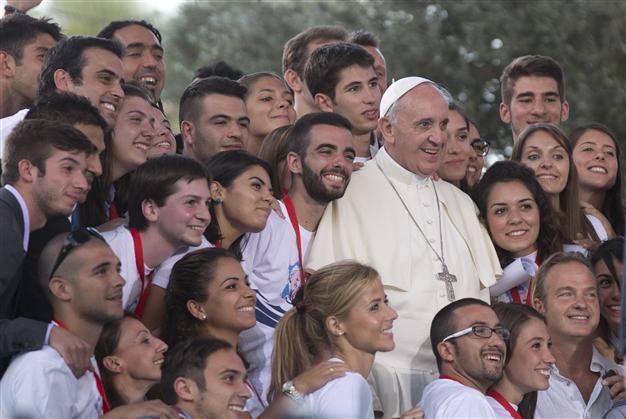Pope defends immigrant rights, denounces 'slave labour'
VATICAN CITY - Reuters

Pope Francis poses for a photo after a meeting with youths in downtown Cagliari, Italy, Sunday, Sept. 22, 2013. AP Photo
Pope Francis urged countries on Tuesday to welcome and respect migrants and refugees and not treat them as "pawns on the chessboard of humanity".
Francis, who has made the defence of the poor and vulnerable a cornerstone of his papacy, said in a message for the World Day of Migrants and Refugees that there should be a change in attitude on the part of host countries.
"Migrants and refugees are not pawns on the chessboard of humanity," he said in the message, which is sent to government and international institutions such as the United Nations.
"They are children, women and men who leave or who are forced to leave their homes for various reasons, who share a legitimate desire for knowing and having, but above all for being more."
He also repeated his condemnation of "slave labour" and trafficking, developing his criticism of a "throwaway culture".
Francis has often used the term to denounce a modern society where people who are not productive, such as the elderly, are neglected and cast off as if they were objects no longer useful.
Immigration is a divisive issue in Europe and beyond. France's far-right National Front, which has an anti-immigrant policy, has been buoyed by improving poll numbers.
Italy's first black minister, Cecile Kyenge, who was born in Africa, has been the butt of racist comments from the anti-immigrant Northern League because she supports automatic citizenship for immigrant children born in Italy.
The steady flow of refugee boats is a also hot issue in Australia, polarising voters this month's election.
The pope, whose own ancestors left Italy for Argentina in the early 20th century and lived through the Great Depression, called for "the elimination of prejudices and presuppositions" in the approach to migration.
"Not infrequently, the arrival of migrants, displaced persons, asylum-seekers and refugees gives rise to suspicion and hostility. There is a fear that society will become less secure, that identity and culture will be lost, that competition for jobs will become stiffer and even that criminal activity will increase," he said.
"Change of attitude" In his message, Francis decried companies and businesses that exploited migrants and refugees, many of whom work for low day wages in agriculture and in illegal factories in Italy and elsewhere in Europe.
"Particularly disturbing are those situations where migration is not only involuntary, but actually set in motion by various forms of human trafficking and enslavement. Nowadays, 'slave labour' is common currency," he said.
In July, Francis chose Lampedusa, the tiny island off Sicily that has been the first port of safety for untold thousands of migrants crossing by sea from North Africa seeking a better life in Europe, as the place for his first trip outside Rome to draw attention to the plight of refugees.
"A change of attitude towards migrants and refugees is needed on the part of everyone, moving away from attitudes of defensiveness and fear, indifference and marginalisation - all typical of a throwaway culture - towards attitudes based on a culture of encounter, the only culture capable of building a better, more just and fraternal world," he said in the message.
Earlier this month, when he visited a refugee centre in Rome, Francis said disused church buildings should be used to house asylum-seekers.
Francis has been a frequent critic of globalisation and on Sunday made one of his strongest attacks on the global economic system, saying it could not longer be based "on a god called money".
In his message on Tuesday, Francis said migrants and refugees were also suffering from the effects of globalisation.
"Development cannot be reduced to economic growth alone, often attained without a thought for the poor and the vulnerable," he said in the message.
